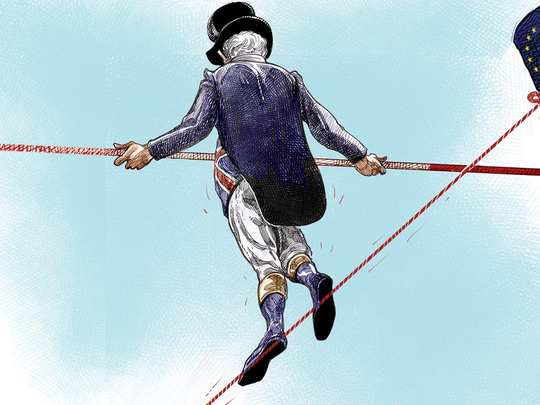
On June 23, the British will vote on whether they want to remain a significant player with some influence over world events, or become an irrelevance with an anachronistically inflated sense of their own importance.
The time of empire had been fading for some time, but was terminally ended by the end of the Second World War in which, Naziism was only defeated — thanks to the eventual intervention of the Americans. Legendary British prime minister Winston Churchill knew the reality of fading British power and spent a lot of his time persuading the then United States president Franklin D. Roosevelt to join the Allies.
Ever since that continental trauma, Britain’s influence in the world has increasingly depended on working with its European allies, as was foreseen by Churchill, who campaigned vigorously in the aftermath of the War for a United States of Europe. He knew that Europe needed an overarching political structure to preserve its peace and build a liberal society that spans language and religion.
If Britain turns its back on its common European heritage, it becomes a minor country on the fringe of events. This was most clearly illustrated over Iraq and Afghanistan when the then British prime minister, Tony Blair, ignored his European allies to indulge in the folly of chasing the nonexistent ‘special relationship’ with the Americans. He took British troops to fight and die in Iraq and Afghanistan in order to gain some kind of special influence over American thinking — and failed spectacularly.
His political intimate, Alistair Campbell, revealed years later that the British had not been told 10 days before the invasion of Iraq that the plans for political reconstruction, which were to have been headed by the US State Department, had been abandoned and instead the allies’ occupation was to be run by the US Defence Department. This deception by the Americans proved that the British and Blair were cruelly foolish if they thought they had any special access to American thinking.
Britain’s solitary irrelevance was further illustrated by Sir Sherard Cowper-Coles, the United Kingdom’s former special representative to Afghanistan and Pakistan, in his book written after retiring, when he described his nonexistent special access to his American opposite number, Richard Holbrooke. On a visit to London, Cowper-Coles had made himself available to consult on what kind of political solution the allies might seek in Afghanistan. Holbrooke was too busy to see his premier ally other than sharing his car ride to Heathrow for half an hour on his way home, when anyway he was on the phone for part of the trip.
Useful platform
On a recent visit to Dubai, leading ‘exit’ campaigner Liam Fox made a laughable case for Britain’s continued influence in the world if it leaves the European Union (EU). The high point of his logic was that Britain’s permanent membership of the United Nations Security Council, and of the Commonwealth, would give Britain a useful platform from which to influence events. He is misinformed if he thinks that Britain’s part in winning the Second World War still entitles it to a permanent seat on the UN Security Council, when genuine powers like India, Indonesia or Brazil are excluded. And his reference to the Commonwealth shows his desperation because the Commonwealth does some great work — only in the social and cultural arenas, which is exactly why it is so valuable.
The Commonwealth does not take part in the world Trade Organisation’s debates, nor has it sent a force to battle the Somali pirates or taken the initiative to lead the opposition to Russia’s malign influence in Ukraine, following its annexation of Crimea.
All these actions were managed by Britain’s allies in the EU, where Britain might have had a lot more influence had it not been cursed with a prime minister in David Cameron, who deliberately flouted EU conventions to try to satisfy the anti-European minority in his own party.
The EU is an exercise in shared power in which all member states pool their sovereignty to their mutual benefit, which they do to different degrees on different issues. Some want completely free movement of people and goods, so signed up for the Schengen Group, while others opted out. Some wanted to join the euro, while others did not.
This flexibility at the heart of Europe happens in the European Council, where the governments of all member states meet on an equal footing and decide their mutual political directions, leaving it to the bureaucracy in the European Commission to implement the policies. There is no doubt that the EU needs to continue to develop and tougher scrutiny of the Commission, by both the Council and the EU parliament, will be a great step forward.
However, the flexibility and mutuality of European decision-making is the key to why the EU has done so well since 1958, when its original members met to sign the Treaty of Rome in one of the most exciting political projects mankind has tried.
Given their terrible history of war and destruction, they dared to seek a peaceful way forward through mutual agreement, without losing their national identities. After almost six decades, it is still an enduring work-in-progress, and one of which Britain should be very proud.










